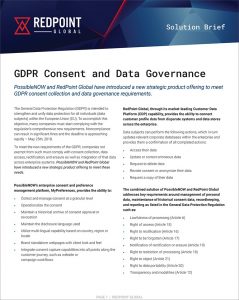
The increasing importance of data privacy for customer-focused companies is also putting a spotlight on data quality and data governance, raising new questions about the value of data initiatives and who, ultimately, is responsible for their success.
Redpoint’s Steve Zisk, Senior Product Marketing Manger, recently discussed the issue with George Firican, a leading expert on data governance and business intelligence and founder of lightsondata.com. Their wide-ranging discussion touched on many topics, including the impact of privacy laws, the relationship between marketing and IT, and how to think about data quality as part of comprehensive data governance. Below is a lightly edited transcript of the conversation.
Steve Zisk: George, thank you so much for joining me today.
George Firican: Hi Steve, thank you for having me.
SZ: As you know, GDPR, CCPA, and other data privacy regulations are making compliance a top priority, and that is certainly true for Redpoint clients. My point of view is that you cannot ensure privacy and compliance without a strong data governance program, with policies and access levels in place to identify data siloes and other potential problem spots.
GF: You’re certainly right about data privacy being top of mind. To expand on your point, data management knowledge areas extend beyond privacy, security, and data quality to include master data management, metadata management, business intelligence, data warehousing, and so on. Data governance is essential to connect all the dots, if you will. As you mentioned, putting policies and procedures in place, establishing ownership, and defining roles and responsibilities is paramount. They all play important roles in each area of data management practices.
SZ:: Where do you see data quality fitting into that, or does it? Are they two completely different things in an organization?
GF: First, you can’t do proper and stable data quality without a data governance program and I can get into details why that is. Second, when you start data governance, data quality becomes a byproduct – if you’re chasing privacy and security, you’re automatically going to tackle data quality aspects even if that’s not your core intention. You can’t ensure privacy and security and compliance with CCPA or GDPR if you don’t know, for example, whether a customer resides in Europe or North America. Even if data quality was not a main driver for starting a data governance program, regulatory compliance would be with data quality as an unintended consequence.
SZ:: That’s an interesting way to put it; that data quality really is a component or as you said a byproduct of governance.
GF: Yes, they go hand-in-hand because data governance – the data governance functions and mandate – will help first to define data quality dimensions, to include identifying roles and responsibilities, assigning stewards to different data elements, and then obviously working with the business and IT to create solutions to resolve various data quality issues.
I liken it to an HR department; they provide guidelines and guidance around hiring, firing, compensation, promotions and the like, but then it’s the employee’s manager who relies on the guidelines as well as their own experience and personal interactions with the employee to make informed decisions and implement change.
SZ:: In a data quality initiative, who in your opinion defines what data quality means? If I think about an organization that has 15 different data siloes and multiple disconnected departments, is there someone at the C-level who helps define what data quality really means beyond the basics like address standardization, phone number standardization, etc.? Where do you think that definition has to come from, considering that need for data consolidation?
GF: Is it a copout to say “It depends on the organization?” That’s the normal consultant answer, but the truth is that it does depend on the data governance program in place, especially if it’s at the organizational level. If a data governance committee is tackling something like customer engagement that would affect the entire enterprise, they’re likely making a collective decision – with different stakeholders from different sides of the business all with a seat at the table.
If the program was instead at a department level, specific to small ‘m’ marketing for example, it could be just the marketing business stakeholders making that decision. It’s always the business that ultimately makes the decision, with the IT team then acting on it.
SZ:: It’s interesting you say IT would be acting on it. Do you see data quality as strictly a function of IT? Not the ‘definition’ per se but the actual process.
GF: You’re right. IT does really come up with those technical solutions; the business mentions “this is why we need to adopt this address standard” for example, and there’s quite a bit of collaboration with IT there as well because IT usually supplies even the business analysis skills. You might have business analysts working with the business to extract these requirements, but in the end it’s the business voicing the need to come up with whatever standard they want, and then it’s IT that develops the unique tools to get that data cleaned and audited and to make sure that no bad data is occurring again and so forth.
Ideally there will then be someone from the business who takes the ownership, stewardship aspect of it and sometimes can run those reports or whenever they’re getting exception reports built by IT they’re acting on it.
SZ:: We work with a lot of marketing departments, and see a constant struggle with IT feeling like they don’t have that seat at the table, and that they’re not as vested in an engagement as they deserve. My opinion is that marketing needs to do a better job of selling their vision to the organization as a whole.
GF: What I’ve noticed is that IT is seen more as a service provider. I think that’s sort of the classical way of thinking about it, but if they’re trying to be seen more as a collaborator in whatever the company is trying to achieve I think they should be engaged earlier on, be more of a sounding board, and be in a position to raise those flags and risks for different scenarios when it comes to technology and the data management aspect.
SZ:: It seems that IT and the data governance program is critical, because while different departments have siloes of data, IT has a lot of institutional knowledge about where data sits, who accesses it and why. I see that as a critical component, but on data quality – outside of the data quality basics such as address standardization, matching, and things like that, do you have any other thoughts on how you define data quality?
GF: A sustainable data quality management program will not just deal with defining what needs to be the standard, but also – and there’s a bit of an overlap with other data management areas, IT, data governance, data stewardship, etc. – one needs to look at it really first from that whole ecosystem, so identify all those data sources that you mentioned, systems, and so forth – identify the data owners, the business rules, figure out the prevention methods, risks, audits, all of it.
Ideally you do that whole analysis to find out who your stakeholders are so you can keep them in front of what you’re planning to do, what you’re doing, and what you’ve done. It’s about getting that continuity because a lot of data quality initiatives or projects have an end date. Fixing a problem, or fixing the data, is not the same as fixing the cause of the problem.
SZ:: So there’s the tactical aspect of certain things, but also process and procedures to help you identify how you got in that state to begin with.
George, this has been a very interesting conversation. Thank you again for joining me to discuss this important topic.
GF: It’s been my pleasure, Steve. Thank you for having me.
As Senior Product Marketing Manager for Redpoint Global, Steve Zisk leverages more than 35 years of expertise in software engineering and product marketing. At Redpoint, Steve develops messaging and marketplace positioning for Redpoint’s customer engagement platforms. Connect with Steve on LinkedIn and Twitter.
George Firican is a Data Governance and Data Management practitioner currently working with The University of British Columbia. As a passionate advocate for the importance of data, he is a frequent conference speaker and YouTuber and has been ranked among Top 35 Global Thought Leaders and Influencers on Digital Disruption and Top 15 on Innovation and Big Data. He advises organizations on how to treat data as an asset, and shares practical takeaways on social media, different industry sites and publications, and is the founder of https://www.LightsOnData.com.
RELATED CONTENT
Real-Time Data Aggregates for Today’s Dynamic Customer Journeys
An Avalanche of State Data Privacy Laws is Coming: What You Need to Know
No Data Left Behind: Analytics, Orchestration, and Making Data Work For You
Be in-the-know with all the latest customer engagement, data management, and Redpoint Global news by following us on LinkedIn, Twitter, and Facebook.

